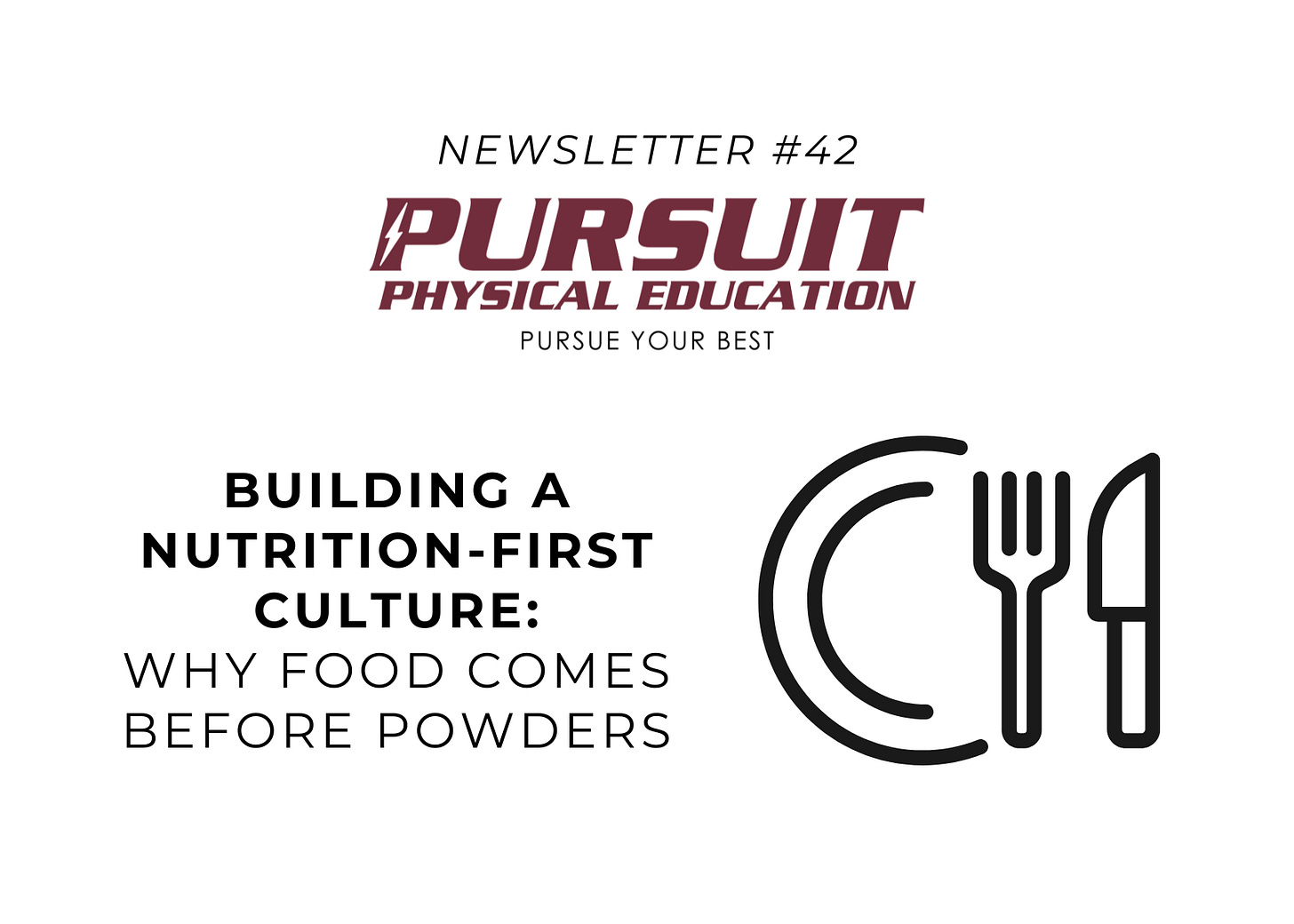Building a Nutrition-First Culture: Why Food Comes Before Powders
#42 - Strength & Speed Coaching - Pursuing Your Best ⚡️
Supplements get all the questions.
And in the next newsletter in the Supplement Smarts series we will talk all about advantages of them.
But food is what actually moves the needle.
Every coach has seen it—athletes asking about protein powder while skipping breakfast. Slamming energy drinks before practice or throughout the school day. Eating nothing before games but wondering why they feel slow and then blaming it on their conditioning level.
We can’t out-supplement poor habits.
That’s why our job isn’t to ignore the supplement conversation—it’s to redirect it.
This issue is about building a nutrition-first culture in your weight room, classroom, and coaching conversations. One that emphasizes real food, consistent fueling, and habits that support long-term growth. Then, after that is established, being able to use supplements in the way they were intended—as a supplement.
Let’s reframe the conversation—one bite at a time.
Why Athletes Ask About Supplements First
Most athletes don’t ask about nutrition.
They ask about shortcuts. Why?
Social media pushes powders and pills
Energy drinks are everywhere
“Gym culture” values hype over habits
Whole food isn’t flashy or easy
But we know what actually works.
Teaching food-first isn’t about shaming supplements. It’s about showing a better, more sustainable path forward.
A Framework for a Nutrition-First Culture
1. Set the Standard Early
If you don’t teach it, they’ll Google it.
We use the REFUEL acronym to anchor our habits:
Remember breakfast
Eat often
Frequently hydrate
Utilize recovery strategies
Eat fruits & vegetables
Lean protein
If you want nutrition-first athletes, teach them what first actually looks like.
2. Reinforce Habits That Drive Performance
You don’t need to be a dietitian to reinforce good habits.
Instead of trying to coach nutrition like a science class, center your messaging around what impacts the athlete today:
What did you eat before lifting?
Are you drinking water throughout the day?
Are you eating after practice?
Let registered dietitians lead in their area of expertise. But as a strength coach, you can still connect daily behaviors to performance outcomes—consistently and respectfully.
3. Model the Mindset, Not the Meal Plan
We don’t provide food—and we don’t make recommendations.
But we can build awareness.
Ask questions. Start discussions. Encourage intention.
If an athlete shows up with an energy drink, ask:
“Did you eat anything today?”
If someone’s dragging in the weight room, remind them:
“Fuel equals performance.”
Make fueling a normal, accepted part of training—without crossing lines on what’s consumed or provided.
4. Use the Protein Shake Conversation Wisely
When a kid asks, “Should I take a shake?”—here’s a redirect:
“Let’s look at your day. Are you eating enough real food at breakfast, lunch, and dinner?”
Most aren’t.
Help them see protein shakes as a gap-filler, not a foundation. Emphasize food-first, habits-first thinking—and keep the conversation grounded in what’s age-appropriate and within your scope.
Coaching Nutrition Without Overstepping
You don’t need a detailed curriculum or certification. What athletes really need are:
Clear standards: Breakfast isn’t optional. Water matters.
Simple anchors: Fuel your effort. Hydrate every day. Eat after training.
Trusted boundaries: You’re not a dietitian—and that’s okay.
Keep the message consistent:
“Supplements aren’t bad—but food comes first. Talk to your parents or a professional before adding anything extra.”
Final Thoughts
We’re not trying to micromanage meals.
We’re trying to create athletes who think critically about their choices and understand the habits that move them forward.
Teach the basics. Stay in your lane. Be a voice of reason.
That’s how we build a food-first, athlete-centered culture that lasts.
What’s Next?
Next Up: Supplement Deep Dive – What’s Safe, What’s Worth It, and What’s Hype
Not all supplements are created equal.
In the next issue, we’ll break down the most common ones high school athletes ask about:
Protein powders
Creatine
Hydration products
Pre-workouts
You’ll get real-world clarity on what’s supported by research, what carries risk, and what language helps you lead the conversation wisely.
Want Help Building Systems That Work?
I offer consulting for PE teachers and Strength & Speed coaches looking to:
Build training systems that fit your school, athletes, and schedule
Improve communication around expectations, nutrition, and athlete growth
Create a strength & speed structure that actually works in-season, off-season, and year-round
If you're looking to strengthen your program without overcomplicating it, I’d love to help.
Just reply or reach out directly and let’s talk shop.
Until then—keep pursuing excellence.
— Preston ⚡️
Paid Subscriber Downloads
Thank you for subscribing to the paid edition of Pursuit PE! Your support helps keep these newsletters growing and grounded in real work with real athletes.
🔒 Mustang Strength & Speed Position Statement on Substance Use
Outlines our stance on PEDs, pharmaceuticals, and supplements. Clear language for athletes and families—designed to protect everyone involved.🔒 Nutrition Habits Self-Assessment
A 20-question self-check tool to help athletes evaluate their daily nutrition, hydration, sleep, and recovery habits. Scored out of 100 with a clear rubric, this resource promotes self-awareness, builds accountability, and sparks meaningful conversations between athletes and coaches.
Not a paid subscriber yet? Upgrade to unlock the full breakdown and exclusive resources!





